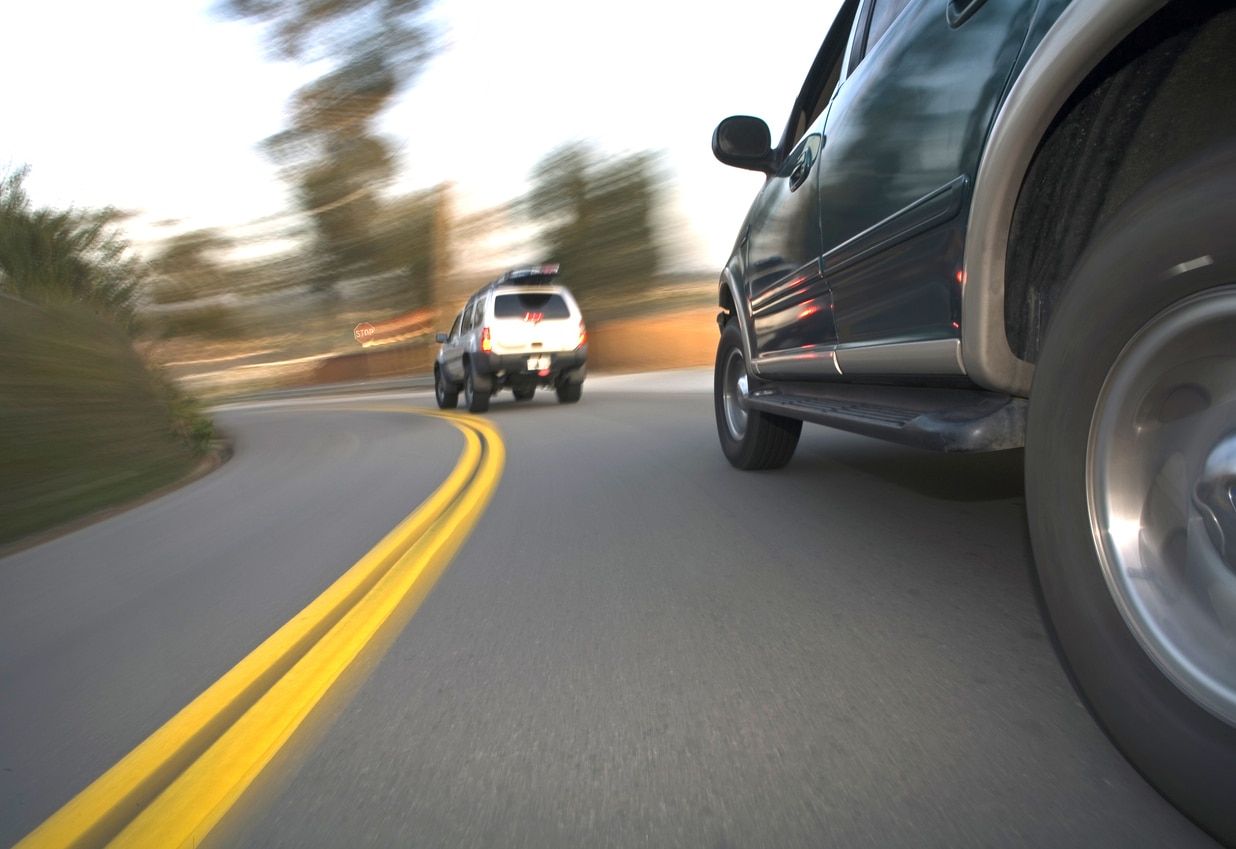According to the California Highway Patrol, officers routinely initiate vehicle pursuits for minor traffic infractions, such as unsafe turns or expired plates. Although some pursuits end quickly and are relatively uneventful, others escalate and may even trigger a “fight-or-flight” response in drivers. The Department of Justice suggests that this unintentional, instinctual reaction to being pursued is what causes many drivers to flee.
Despite yielding questionable results, police pursuits remain commonplace. If you are a driver in California, it is important to understand that fleeing an officer can result in a felony reckless evading vehicle charge under Vehicle Code VC 2800.2. Also known as “felony evading,” this offense may carry serious, life-altering penalties, including prison, which is why you must avoid conviction.
If you have been charged with felony evading, you need to seek out an experienced felony evading defense lawyer in California as soon as possible. Luckily, you don’t have to look too far: Cherish Om is here to help. Contact our law firm to schedule an initial consultation.

Understanding the Felony Reckless Evading Law in California
You cannot face charges under California Vehicle Code 2800.2 VC unless you first violate Vehicle Code 2800.1—“evading a peace officer.” If you flee from a police officer in a motor vehicle or on a bicycle, you may be charged with a misdemeanor under this section.
Evading police may be considered a felony under VC 2800.2 if you drive recklessly or with a “willful or wanton disregard” for the safety of others. However, a lesser misdemeanor charge is also possible under Felony Reckless Evading VC 2800.2, depending on the specifics of your situation.
Factors a Prosecutor Must Prove for a VC 2800.2 Conviction
Remember: The burden of proof lies with the prosecutor. In order to convict you under VC 2800.2, the prosecutor must establish at least two factors: 1) You knew you were being pursued by a police officer and 2) you purposely evaded that officer. If the prosecution is unable to demonstrate these key elements of the crime, they may have insufficient evidence for conviction.
If you were not aware that you were being pursued by an officer, you cannot be convicted under Felony Reckless Evading VC 2800.2. Police must make their presence known with distinctively marked vehicles and visual/audible warnings. Without these signals, you may assume that you are being pursued by an aggressive civilian—in which case you would have every right to flee for your safety.
Prosecutors must also establish that you intended to evade the peace officer. If you were driving away from the officer without the criminal intent to evade, it may be difficult for prosecutors to achieve a conviction, as there are many reasons why a motorist might be traveling in a direction opposite to a peace officer’s vehicle.
Penalties for a Felony Reckless Evading Conviction
In California, felony reckless evading is what’s known as a “wobbler” offense, meaning that it can be prosecuted as either a felony or a misdemeanor. However, many of these charges are considered felony offenses. The specific penalties you face for a felony reckless evading conviction will depend on a variety of factors, including whether or not you have a criminal history.
The First Violation of VC 2800.2
As with many crimes, defendants can expect lighter sentences for first-offense felony evading. A first violation of VC 2800.2 may be treated as a misdemeanor and punished more leniently than a felony offense. The mandatory minimum jail sentence is six months, and the maximum jail sentence is one year. You may also face a fine of between $1,000 and $10,000.
The Second Violation of VC 2800.2
A second violation of VC 2800.2 is more likely to result in a felony charge. Although the length of incarceration is identical to the misdemeanor felony evading penalty, you will face a prison sentence instead of a county jail sentence. Additionally, a felony conviction will have a greater long-term impact on your criminal record and your rights and will result in the suspension of your driver’s license.

What Is Willful or Wanton Disregard for Safety?
It is important to understand that you will only face charges under Felony Reckless Evading VC 2800.2 if you demonstrate a “willful or wanton disregard” for the safety of others. California law under VC 2800.2(b) states that you will meet this requirement if you commit three or more traffic violations (such as running a red light or stop sign) while evading a peace officer.
Any act that causes property damage will also be defined as willful or wanton disregard for safety—even if there is zero chance of serious bodily injury. Finally, VC 2800.2(b) states that this definition is “not limited to” property damage or traffic violations. In other words, prosecutors and police officers may use their discretion to define “willful and wanton disregard for safety” in any way they deem appropriate.
What California Crimes Are Related to Felony Evading?
The criminal laws surrounding reckless evading are complex, and many charges are closely related. In this section we will discuss some of the offenses closely connected to felony evading.
VC 2800.1 Misdemeanor Evading an Officer
If you do not exhibit a willful or wanton disregard for human safety, you may still face misdemeanor evading charges for fleeing a police officer. If convicted under VC 2800.1, you will face a jail sentence of up to one year.
VC 2800.3 Evading Causing Injury or Death
One of the most serious evading charges in California is VC 2800.3. You will face this charge if you cause serious injury or death while fleeing from a peace officer. If you cause a serious injury, you will face a felony charge and a prison sentence of three, five, or seven years. A fine of up to $10,000 is also possible. If you cause a death, you will face a prison sentence of four, six, or ten years.
PC 415 Disturbing the Peace
If the police pursuit results in excessively loud noises, you could be charged with disturbing the peace under Section 415 of the Penal Code. Disturbing the peace is a misdemeanor in California, and it may result in a jail sentence of up to 90 days and a fine of up to $400.
VC 23103 Reckless Driving
Even if you escape charges under Felony Reckless Evading VC 2800.2, you may still face consequences for reckless driving. VC 23103 includes a similar definition for “willful and wanton disregard for safety” and is punishable by a jail sentence of up to 90 days, a fine of up to $1,000, or both. It is possible to face charges for both reckless driving and felony reckless evading for the same incident.
Possible Defenses to Felony Reckless Evading Charges
Ultimately, the best defense strategy for you will depend on the unique circumstances of your case. After thoroughly reviewing your case, your attorney may suggest one of the defense strategies discussed below.
You Lacked the Intent to Evade
If you never intended to evade the police, you may escape conviction. For example, you might have assumed that a distant police vehicle was pursuing someone else. Perhaps you were distracted by a hands-free phone call or loud music and never heard the sirens, or maybe you were trying to find a safe spot to pull over before stopping. Any of these reasons may be enough to demonstrate your lack of intent to commit a crime.
You Were Too Drunk to Realize You Were Being Pursued
Intoxication may prevent defendants from realizing that the pursuing peace officer is attempting to pull them over. In this situation, the defendant may successfully argue that they lacked the specific intent to evade. Although you may still face penalties for driving under the influence (DUI), this strategy can help you avoid a felony conviction.
The Traffic Stop Was Unconstitutional
If a police officer attempts to make an unconstitutional traffic stop, everything that occurs after this attempt is inconsequential. The Fourth Amendment of the United States Constitution protects citizens from unreasonable searches or seizures, and a traffic stop is a form of “seizure,” which is why it is unlawful for police officers to initiate pursuits without probable cause or reasonable suspicion of a crime.
If you can establish that a peace officer violated your Fourth Amendment Rights prior to the pursuit, you may avoid charges under Felony Reckless Evading VC 2800.2. However, police officers in California often initiate pursuits due to alleged traffic violations such as broken tail lights. If a peace officer lacks the evidence to back up these claims, they may struggle to justify why they initiated the pursuit in the first place.
The Police Vehicle Was Not Clearly Identified
Felony Reckless Evading VC 2800.2 states that unless the police vehicle in question is clearly identified, a defendant cannot face charges. Law enforcement officers and their vehicles must satisfy all of the following requirements in order to justify a conviction under Felony Reckless Evading VC 2800.2:
- They must activate at least one red lamp that is visible from the front.
- They must make reasonable use of their siren.
- The vehicle must have distinctive police markings
- The police officer operating the vehicle must be in distinctive uniform.
Police officers on bicycles must also meet certain requirements, including the following:
- The bicycle must have distinctive police markings.
- The officer operating the bicycle must be in uniform.
- The officer must give a verbal command to stop.
- The officer must activate a horn with a volume of at least 115 decibels.
- The officer must use hand signals to command the person to stop.
- The suspect “reasonably should have been aware” of these factors.
Failure to meet these requirements can result in a failed conviction. Although the possible defense strategies we’ve discussed are among the most common, they aren’t the only ones at your disposal. Your criminal defense lawyer can help you select the best defense strategy to secure a favorable case outcome.
Felony Reckless Evading VC 2800.2 FAQs
The laws surrounding vehicle violations and similar crimes are complex. If you have questions about your charges, the best way to get answers is by speaking with a trusted attorney. In the meantime, read through the answers to a couple of our most frequently asked questions.
• Can a conviction for felony reckless evading affect any of my other rights?
Anyone convicted of a felony in California is likely to lose various rights, including the right to vote, the right to hold public office, the right to travel, and the right to serve on a jury. It is worth mentioning, however, that a felony conviction does not affect your ability to run for president in a federal election. Other possible consequences include deportation, the loss of certain parental rights, and the loss of access to housing.
• Can I own/possess/acquire/receive a firearm if convicted of felony reckless evading?
Convicted felons are prohibited from owning firearms in California. This prohibition is permanent unless the felony is expunged or pardoned. It is possible to have a felony evading charge expunged after lowering it to a misdemeanor, but it is much easier to avoid conviction in the first place.
The Law Office of Cherish Om: Trusted Criminal Defense Attorneys in California
While online research represents a positive first step for defendants facing felony evading charges, it can only get you so far. During a consultation with an experienced criminal defense attorney in California, you can discuss your circumstances in more detail and assess potential defense strategies. Contact the Cherish Om Law Office today to discuss your legal options and protect your future.

(831) 281-4964
om-law@outlook.com
1050 S. Green Valley Rd.
Watsonville, Ca 95076
